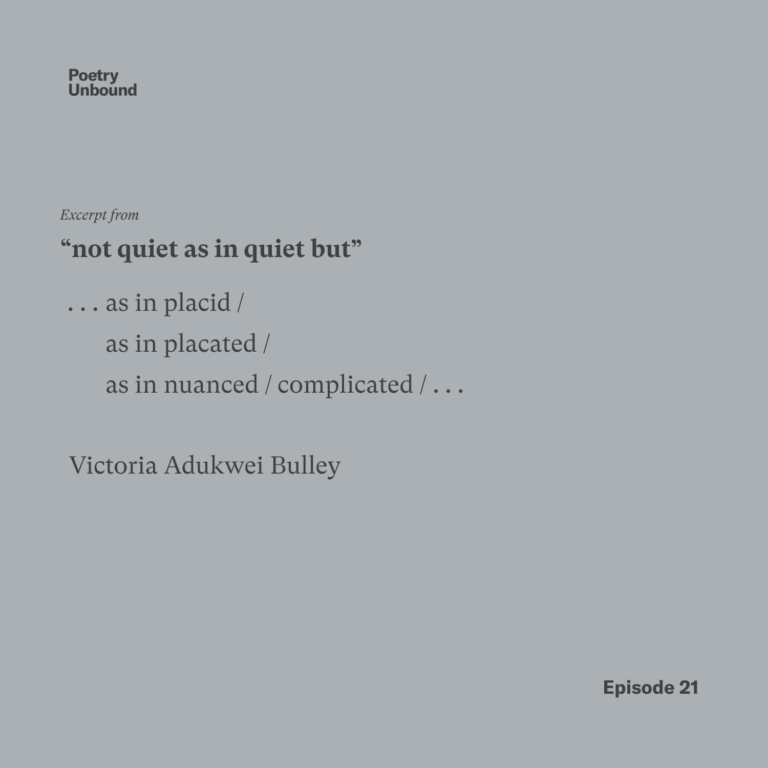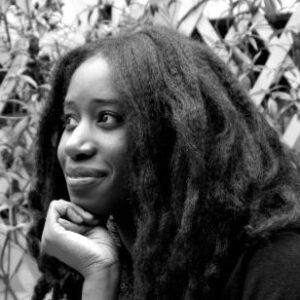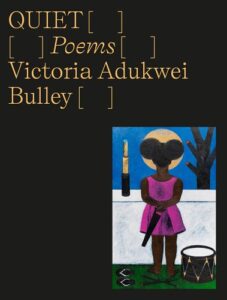Victoria Adukwei Bulley
not quiet as in quiet but
Quiet. Shhh. Softly. Don’t make a fuss. Don’t upset the authorities. Victoria Adukwei Bulley unquiets the quiet.
We’re pleased to offer Victoria Adukwei Bulley’s poem, and invite you to connect with Poetry Unbound throughout this season.
Pre-order the forthcoming book Poetry Unbound: 50 Poems to Open Your World and join us in our new conversational space on Substack.

Guest

Victoria Adukwei Bulley is a poet, writer, and artist. She is the author of Quiet (Faber Books 2022; Knopf 2023), which was shortlisted for the 2022 T.S. Eliot Prize. Bulley is currently a doctoral student at the Royal Holloway, University of London. Image by Timothy Pulford-Cutting.
Transcript
Pádraig Ó Tuama: Friends, thanks very much for listening to Poetry Unbound. The Poetry Unbound book is out in loads of places around the world, and it’s almost out in the U.S. On December the 6th it will be launched in the U.S. And they’ll make a great holiday gift if you want to buy one or more than one. You can preorder a copy of the book at poetryunbound.org. And if you’re listening before the launch date, you can join us for an online launch in the evening of December the 6th. It’s all free and you can register for that too at poetryunbound.org. I look forward to meeting you on the page or meeting you at the launch.
[music: “Praise the Rain” by Gautam Srikishan]
My name is Pádraig Ó Tuama, and as long as I’ve been writing and reading poetry, there have been particular words at particular times that, for a while, really land with me. You know, for a long time the word “belonging” was fantastic. And then the more I got involved in working in conflict resolution, particularly between groups, I could see that belonging to a particular group can sometimes deepen the experience of conflict for anybody who isn’t in that group. And so belonging on the one hand, is a draw to great connectedness, but also a draw to great separation or even sectarianism.
And so the word belonging is one that I still like. But there’s layers to it. And anytime I find myself loving a word, thinking, “Oh, this is the word for the moment,” these days, I find myself looking for some of the edges of it to think, “Well, is this word so good for everybody? And how can I find a way to explore it?”
[music: “Praise the Rain” by Gautam Srikishan]
“not quiet as in quiet but” by Victoria Adukwei Bulley.
“not quiet as in quiet but
“as in peaceful /
as in slow to anger /
as in shy /
as in sulking or sullen /
as in nice /
as in clean, tree-lined streets /
as in well-resourced libraries /
as in good, outstanding schools /
as in not much new /
as in no news is good news /
as in the war is over; has been for decades now /
as in early to bed / curled up with a book /
as in the newborn is sleeping /
as in TV barely audible /
as in subtitles /
as in subtext /
as in someone should’ve done something /
as in don’t just do something, stand there /
as in could & should but wouldn’t /
as in well the British are / so polite /
as in placid /
as in placated /
as in nuanced / complicated /
as in careful it’s a conflict, not a siege, a conflict /
as in objective /
as in both sides /
as in well behaved /
as in safe /
as in too quiet /
as in almost silent /
as in almost no sirens /”
[music: “Catching Water” by Gautam Srikishan]
This poem is from Victoria Adukwei Bulley’s first book, and that book is called Quiet. And it considers the idea and the word and the practice of quietude through a personal lens and political lens and social and racial and artistic and gendered lenses, too. What is it? Like, what is the word “quiet”? And can the word quiet mean a few things?
I remember years ago when people began to say, “not funny as in haha, but funny as in weird.” And realizing that probably different communities of people in different languages have been saying things like that for a very long time. It’s easily said these days in social media, and I love what Victoria Adukwei Bulley has done here in terms of saying “not quiet as in quiet but” as the title and then unfolding. I think it’s 31 unfoldings that she does here. And they’re in, to my mind anyway, different categories. You know, the first ones are peaceful, slow to anger, shy, sulking, sullen, nice. They’re complicated enough, but they’re relatively ordinary.
And then it moves to social. Looks at the streets, and who gets a quiet, “clean, tree-lined street”? And who gets a library, a well-resourced one? And who gets to go to a “good, outstanding school”? What’s the quietude about that? And then it continues. To my mind, when she says:
as in subtitles /
as in subtext /
That’s when the poem really begins to go deep into the underground of the word “quiet.” Someone should have done something. “…don’t just do something, stand there / …” So “polite,” “placid,” “placated.”
And then there’s this idea of, of “both sides.” “…careful it’s a conflict, not a siege…,” “objective,” “both sides.” The news is being explored here. Certainly the word “news” occurs over and over again at the top of the poem. But also the response from the community, the broadcasting voice, who says what kind of quiet is good? Who says what kind of quiet or disquiet is bad? Over and over again, this poem, “not quiet as in quiet but,” just goes down to depth, to depth, to depth through this word: quiet.
[music: “The Onyx” by Blue Dot Sessions]
When I think of the political lenses of the word “quiet” in this poem, the question about the news about the war being over, for whom? And the question about your own internal world taking ease from living in a world that’s at quietude with itself. Those are all lovely things that we’d hope for everybody, I think. But the poem is troubling the idea as to whether they are really in existence for everyone.
Each of the lines in this poem is almost functioning like its own stanza. So when she says:
as in no news is good news /
as in the war is over; has been for decades now /
as in early to bed / curled up with a book /
Those three are right after each other, but each with a space in between. And I find myself wondering: what’s the space? What’s the tension in between these lines doing? For whom is the war over? And who can go early to bed and curl up with a book? For whom is it occurring in a way that is giving a depth of peace? And for whom is it working in a way where their experience is being quietened, erased, silenced? “[A]s in the British are / so polite /.” And then “placid” and “placated,” “nuanced” and “complicated”.
There’s a way of controlling and saying to people, “Well, if you want to object, just object quietly. Don’t call it a siege. It’s a conflict. Let’s be objective and look at both sides. Let’s be well behaved. Let’s be quiet in how we speak about these things.” The underbelly of the word “quiet” is occurring and rising up over and over in this poem, and toward the end, the poem begins to indicate that:
as in too quiet /
as in almost silent /
as in almost no sirens /
For whom? For whom is it too quiet? What does “too quiet” indicate? What does “almost silent” indicate? And “almost no sirens.”
[music: “Every Place We’ve Been” by Gautam Srikishan]
When it comes to a poem like this that is so clearly a poem in conversation with other poems in the book, you know the book’s called Quiet — this poem is called “not quiet as in quiet but” — I find myself wondering: what is the work of this poem? What is it contributing? What’s it trying to do in the writer? What’s it trying to do in me as I read it?
I find myself drawn into wanting to bring the word quiet into scrutiny, to look at everything it can mean and to consider that sometimes quiet might be an act of praise, and other times quiet is a way of resistance. And other times quiet, then, is a way of repression. I want to look at how quiet can be a relief sometimes, or an exposure of other kinds of forcing a certain imagination about what quietude can mean.
So many friends of mine who are parents will say that they suddenly became alert because their house was too quiet. Maybe because they’re used to there being a certain undercurrent of noise and that quiet itself is an indication of something that’s been concealed and something perhaps that shouldn’t be concealed. It can be lovely, but perhaps there’s some danger that’s occurring in quiet here, too.
Finally, there’s a question here about who gets to decide what kind of quiet is good quiet? Who gets to decide that standard? Who gets to say, “This is the pitch at which our public conversation will take place, or our private conversation will take place or our private conversation will take place?”
Victoria Adukwei Bulley is allowing tension to be present and she isn’t resolving it. She is saying, “these are 31 ways that you can examine the experience about what quiet might mean other than just quiet.” And she’s saying, “maybe all of these 31 ways are existing all the time and more. And therefore, let’s use the doorway of a poem to open up imagination about how to explore quiet when it is that next we come across it in our personal life, in our community life, home life, public life, in political life. All of these ways where the word “quiet” might be used as if it can mean only one thing.” And she’s saying, “Look, it probably means many more. And 31 is only just a start.”
It’s extraordinary and brilliant and she doesn’t resolve it. She lets it on the page, sit there in all of its tension.
[music: “Catching Water” by Gautam Srikishan]
“not quiet as in quiet but” by Victoria Adukwei Bulley.
“not quiet as in quiet but
“as in peaceful /
as in slow to anger /
as in shy /
as in sulking or sullen /
as in nice /
as in clean, tree-lined streets /
as in well-resourced libraries /
as in good, outstanding schools /
as in not much new /
as in no news is good news /
as in the war is over; has been for decades now /
as in early to bed / curled up with a book /
as in the newborn is sleeping /
as in TV barely audible /
as in subtitles /
as in subtext /
as in someone should’ve done something /
as in don’t just do something, stand there /
as in could & should but wouldn’t /
as in well the British are / so polite /
as in placid /
as in placated /
as in nuanced / complicated /
as in careful it’s a conflict, not a siege, a conflict /
as in objective /
as in both sides /
as in well behaved /
as in safe /
as in too quiet /
as in almost silent /
as in almost no sirens /”
[music: “Praise the Rain” by Gautam Srikishan]
Chris Heagle: “not quiet as in quiet but” comes from Victoria Adukwei Bulley’s book Quiet. Thank you to Knopf, and Faber & Faber who gave us permission to use Victoria’s poem. Read it on our website at onbeing.org.
[music: “Praise the Rain” by Gautam Srikishan]
Poetry Unbound is: Gautam Srikishan, Eddie Gonzalez, Lilian Vo, Lucas Johnson, Amy Chatelaine, Kayla Edwards, and me, Chris Heagle.
Our music is composed and provided by Gautam Srikishan and Blue Dot Sessions.
This podcast is produced by On Being Studios, which is located on Dakota land. Open your world to poetry with us by subscribing to our Substack newsletter at poetryunbound.org. You may also enjoy our other podcast On Being with Krista Tippett, or our newsletter, The Pause. Visit us at onbeing.org to find out more.
Books & Music
Recommended Reading
The On Being Project is an affiliate partner of Bookshop.org and Amazon.com. Any earnings we receive through these affiliate partnerships go into directly supporting The On Being Project.








